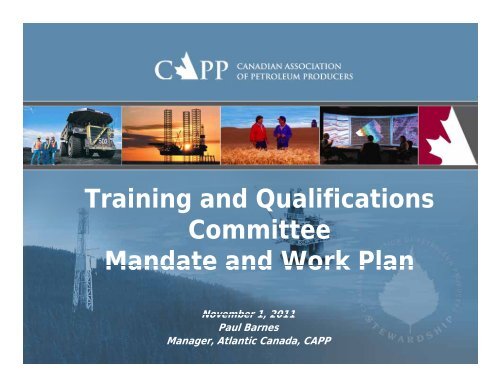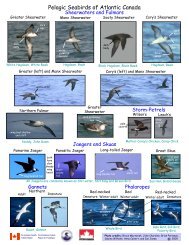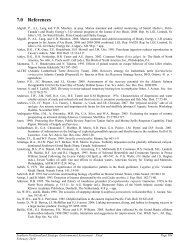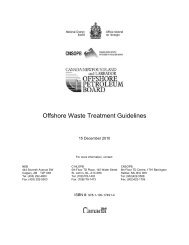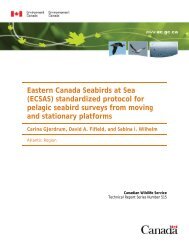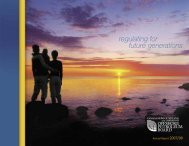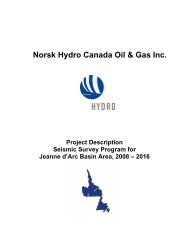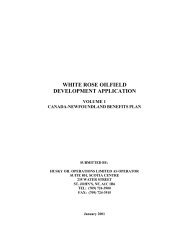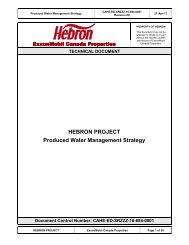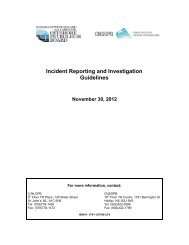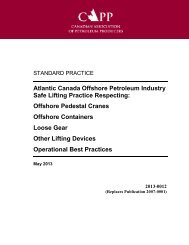Training and Qualifications Committee Mandate and Work Plan
Training and Qualifications Committee Mandate and Work Plan
Training and Qualifications Committee Mandate and Work Plan
- No tags were found...
Create successful ePaper yourself
Turn your PDF publications into a flip-book with our unique Google optimized e-Paper software.
<strong>Training</strong> <strong>and</strong> <strong>Qualifications</strong><strong>Committee</strong>M<strong>and</strong>ate <strong>and</strong> <strong>Work</strong> <strong>Plan</strong>November 1 2011November 1, 2011Paul BarnesManager, Atlantic Canada, CAPP
Presentation Outline• <strong>Training</strong> <strong>and</strong> <strong>Qualifications</strong> <strong>Committee</strong> (TQC)• <strong>Training</strong> <strong>and</strong> <strong>Qualifications</strong> St<strong>and</strong>ard Practice• Development of training st<strong>and</strong>ards• Course quality reviews• Competency-based st<strong>and</strong>ard development
Who is CAPP• The voice of Canada’s Upstream Oil <strong>and</strong> Gas Industry• Mission: to enhance the economic sustainability of the Canadian upstreampetroleum industry in a safe <strong>and</strong> environmentally <strong>and</strong> socially responsiblemanner, through constructive engagement <strong>and</strong> communication withgovernments, the public <strong>and</strong> stakeholders in the communities in which weoperate• Represents companies, large <strong>and</strong> small, that explore for, develop <strong>and</strong> producenatural gas <strong>and</strong> crude oil throughout Canada• CAPP's associate members provide a wide range of services that support theupstream crude oil <strong>and</strong> natural gas industry• CAPP members produce more than 90 per cent of Canada’s natural gas <strong>and</strong>crude oil• Offices in St. John’s <strong>and</strong> Calgary• <strong>Work</strong>s with members on broad industry issues <strong>and</strong> initiativesthat affect the industry• A member of <strong>and</strong> provides secretariat services to the <strong>Training</strong>• A member of, <strong>and</strong> provides secretariat services to, the <strong>Training</strong><strong>and</strong> <strong>Qualifications</strong> <strong>Committee</strong> <strong>and</strong> is the custodian of the<strong>Training</strong> & <strong>Qualifications</strong> St<strong>and</strong>ard Practice
CAPP Atlantic Canada GovernanceCAPP Board of GovernorsAtlantic Canada Executive Policy GroupOther EPGsEnvironment <strong>Committee</strong>Safety <strong>Committee</strong>TQCCommunications <strong>Committee</strong>OperationalTask Groups
The <strong>Training</strong> <strong>and</strong> <strong>Qualifications</strong> <strong>Committee</strong> (TQC)• Multi-stakeholder <strong>Committee</strong> established to addresstraining i <strong>and</strong> qualifications needs for the AC offshoreworkforce• Reviews <strong>and</strong> updates the CAPP Atlantic Canada Offshore PetroleumIndustry St<strong>and</strong>ard Practice for the <strong>Training</strong> <strong>and</strong> <strong>Qualifications</strong> ofPersonnel (TQSP)• Identifies <strong>and</strong> considers other training <strong>and</strong> qualifications needs(including reciprocity issues with other jurisdictions <strong>and</strong> quality oftraining offered locally)• Aims to work collaboratively with groups that have relatedm<strong>and</strong>ates (for example HOSC)• Governed by a formal TOR <strong>and</strong> meets on a monthlybasis
TQC Membership• Current TQC members• 1 CAPP staff representative (secretariat)• 2 Canadian Association of Oilwell Drilling Contractors (CAODC)representatives• 2 Offshore Petroleum Board representatives (NS <strong>and</strong> NL)• 3 industry representatives (from the CAPP Safety <strong>Committee</strong>)• TQC members report to theirrespective organizations• TQC also includes ad hoc members• <strong>Training</strong> Institutes tutes (Marine Institute tute – Offshore Safety <strong>and</strong> SurvivalCentre in NL <strong>and</strong> Survival Systems <strong>Training</strong> Ltd in NS)• Marine Safety Council (1 representative)
<strong>Training</strong> <strong>and</strong> <strong>Qualifications</strong> St<strong>and</strong>ard Practice(TQSP)• Outlines the• training required for all personnel travelling/working offshore(e.g. basic survival training, etc.)• specialized or technical training/qualifications required byposition (marine position, drilling rig, production installation)• specialty teams training (e.g. helideck team, fire team, first aidteams, etc.)• Structured to allow application to each type ofinstallation likely to operate in Atlantic Canadaoffshore
<strong>Training</strong> <strong>and</strong> <strong>Qualifications</strong> St<strong>and</strong>ard Practice(TQSP)• TQC updates the TQSP as needed; <strong>and</strong> publishes anew version every 2 years• For example gas detection <strong>and</strong> confined space (this is trainingoperators provide but is not yet included d in the TQSP, it is theintent of the TQC to add these for the next revision)• Also, next version will be improved with a more user-friendlylayout• Updating the TQSP involves a consultationprocess with stakeholders, including the offshoreworkforce in both provinces (process outlined onnext slides)
Process of Updating the TQSP• Proposed changes are brought to the TQC forreview by any user of the TQSP• TQC evaluates suggested changes on anongoing basis, formal review includes aChange Request Form describing theproposed change <strong>and</strong> its rational• On an annual basis, prior to issuing a newTQSP, proposed changes are provided tostakeholders for review (including theworkforce via the Joint Occupational Health<strong>and</strong> Safety <strong>Committee</strong>s)
Process of Updating the TQSP, con’t• A 45-day consultation period commences within whichfeedback on the proposed changes is collected• The TQC has a stakeholder consultation process in which all members ofthe TQC are responsible for consultation within their organization <strong>and</strong> withother stakeholders• For example: training institute representatives are to consult with otherpotentially impacted training institutes; Operators are responsible forconsulting with their workforce, etc.• The TQC reviews <strong>and</strong> addresses any feedback received• A recommended update is then presented to CAPP AC EPG <strong>and</strong>the Boards for review <strong>and</strong> ratification• Upon completion of this process a revised TQSP is publishedfor use, replacing the previous version
Course Quality Reviews – Project Overview• Multi-year program to review safety trainingcourses required by the TQSP that did not have athird-party audit process associated with them• BST, BST-R, OSI, coxswain training, fire team training, fire teamrecurrent, HUEBA training, helicopter l<strong>and</strong>ing officer training,hazardous areas EX training• Managed by an independent consultant• Governed by criteria established by TQC(described on subsequent slide)• Reviews undertaken by a team (consultant,subject matter expert <strong>and</strong>, at times, TQC memberreps)
Course Quality Reviews – Criteria• Course delivery accurately reflects the curriculum<strong>and</strong> training objectives• The training provider• has appropriately p qualified instructors• ensures an appropriate student / instructor ratio• has an appropriate facility <strong>and</strong> the necessary equipment• has appropriate course materials <strong>and</strong> training i aids• effectively manages logistics <strong>and</strong> course duration• properly p monitors <strong>and</strong> records attendance, participation p <strong>and</strong>examination• has appropriate document control <strong>and</strong> quality managementprocesses• has appropriate processes/personnel in place to assure the safety ofcourse participants
Course Quality Reviews – Project Status• 5 course reviews complete, reports are with TQC fordiscussion / action• BST, BST-R, Hazardous Areas EX, HUEBA <strong>and</strong> Helicopter L<strong>and</strong>ingOfficer• 4 course reviews currently underway• Fire Team <strong>and</strong> its recurrent, OSI <strong>and</strong> Coxswain training• Outcomes are discussed by the TQC <strong>and</strong> action takenby <strong>Training</strong> Institutes or TQC as necessary, e.g.:• BST/BST-R quality found to be very good at both TIs; a few areas oftraining discussed <strong>and</strong> implemented by TIs (e.g. HUET fidelity at MI-OSSC <strong>and</strong> launch <strong>and</strong> loading of davit life rafts at SSTL)• major finding included d opportunity to improve consistency across theTIs = competency-based st<strong>and</strong>ard development (e.g. basic survivaltraining, helicopter l<strong>and</strong>ing officer)
Competency-Based St<strong>and</strong>ards Development• To identify exact skills <strong>and</strong> knowledge required bythe trainee in order to receive a course certificate• the current st<strong>and</strong>ard outlines course content, not what skills need tobe displayed d by the studenttDNV (Norwegian training consultant) engaged at• DNV (Norwegian training consultant) engaged atoutset to provide advice <strong>and</strong> direction in developinga st<strong>and</strong>ard that details the extensive content of thebasic survival training courses
Competency-Based St<strong>and</strong>ards Development• Principle benefits• greatly improved documentation of course quality <strong>and</strong> content• improved consistency across training institutes• TQC has recognized that this approach to st<strong>and</strong>ardwriting is superior to listing course content t – as theTQSP is amended over time course / trainingrequirements will shift to follow this process
TQC Current Priorities• Concluding 2011 work• engage JOSHC in review of proposed changes• Complete outst<strong>and</strong>ing course quality reviews• Continue development of competency-basedtraining st<strong>and</strong>ards• Coxswain training• Helicopter L<strong>and</strong>ing Officer <strong>Training</strong>


